Battle for the history
“Just a century ago people in France and Europe could easily differentiate Rus’ from Muscovy”, Theodore Casimir Delamarre, owner and editor in chief of La Patrie, said back in 1869 in his petition to the French senate.
“History shouldn’t forget, people we know now as Ruthenians were known previously as Rusians (spot single “s”) or Ruses and people we call now as Russians were Muscovites and their land was called Muscovy”, added Delamarre.
Translated by Igor Antonyuk
Читати українською
Once there was Muscovy and now it’s… Rus’
A couple of centuries ago the whole world knew what Muscovy was. Nowadays, however, the situation is radically different and the history of Rus’ has become a grotesque parody – all thanks to the long lasting, richly sponsored Russian propaganda. Just think about it – Russia has created a colossal fake and made the whole world believe it!
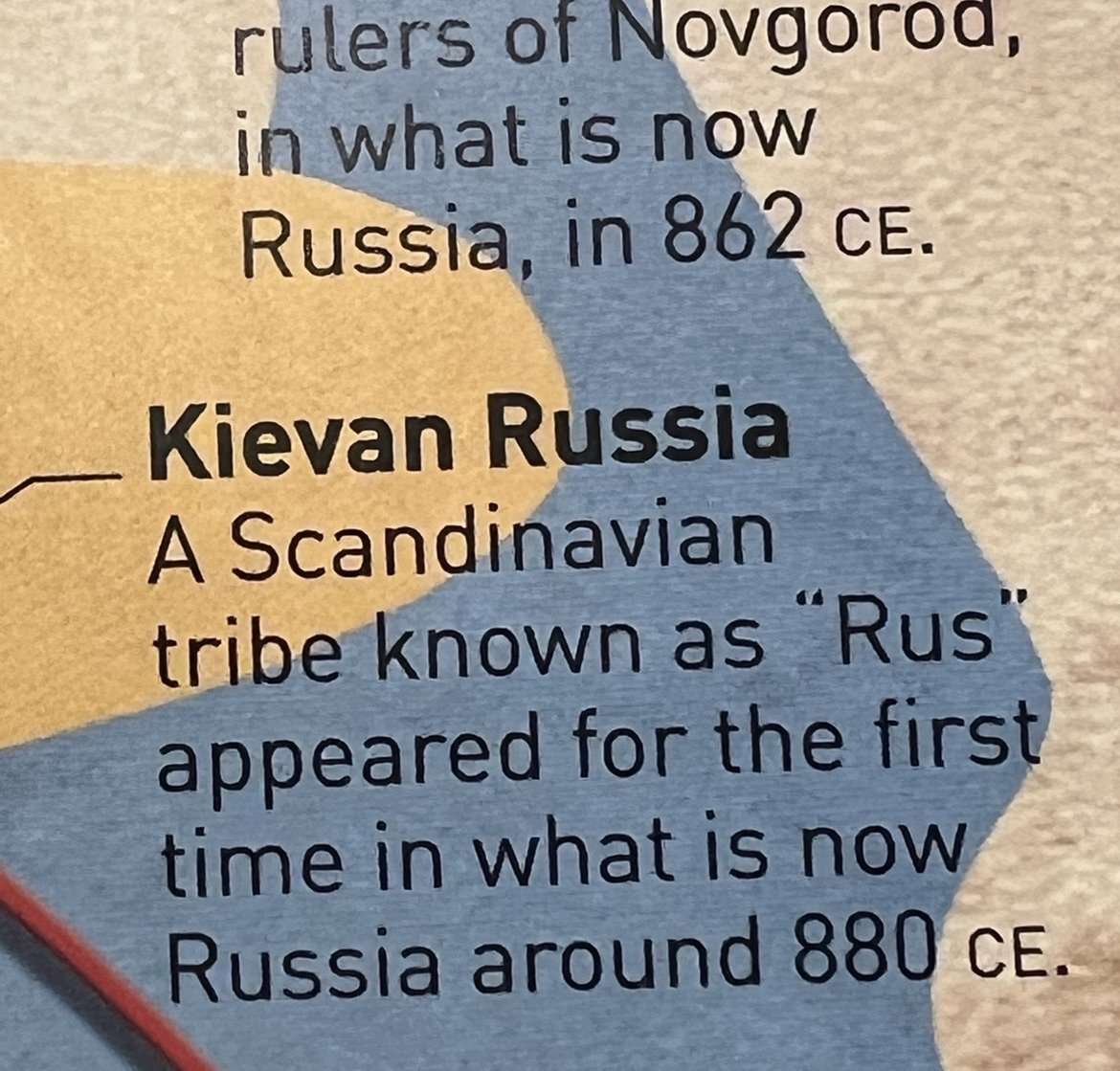
I live in London and used to speak with people who don’t know well what Ukraine is whilst their understanding of Russia is full of myths.
A couple of days ago I chatted with someone who argued about Ukraine and history – and I was simply shocked. Foreigners are used to think that modern Russia descends from medieval Rus’ with its centre in Kyiv… because it simply sounds almost identical!
As it stands, people do not differentiate these two countries from completely different historical epochs – Rus’ and Russia – and never heard of a “rebranding” taking place in 1721.
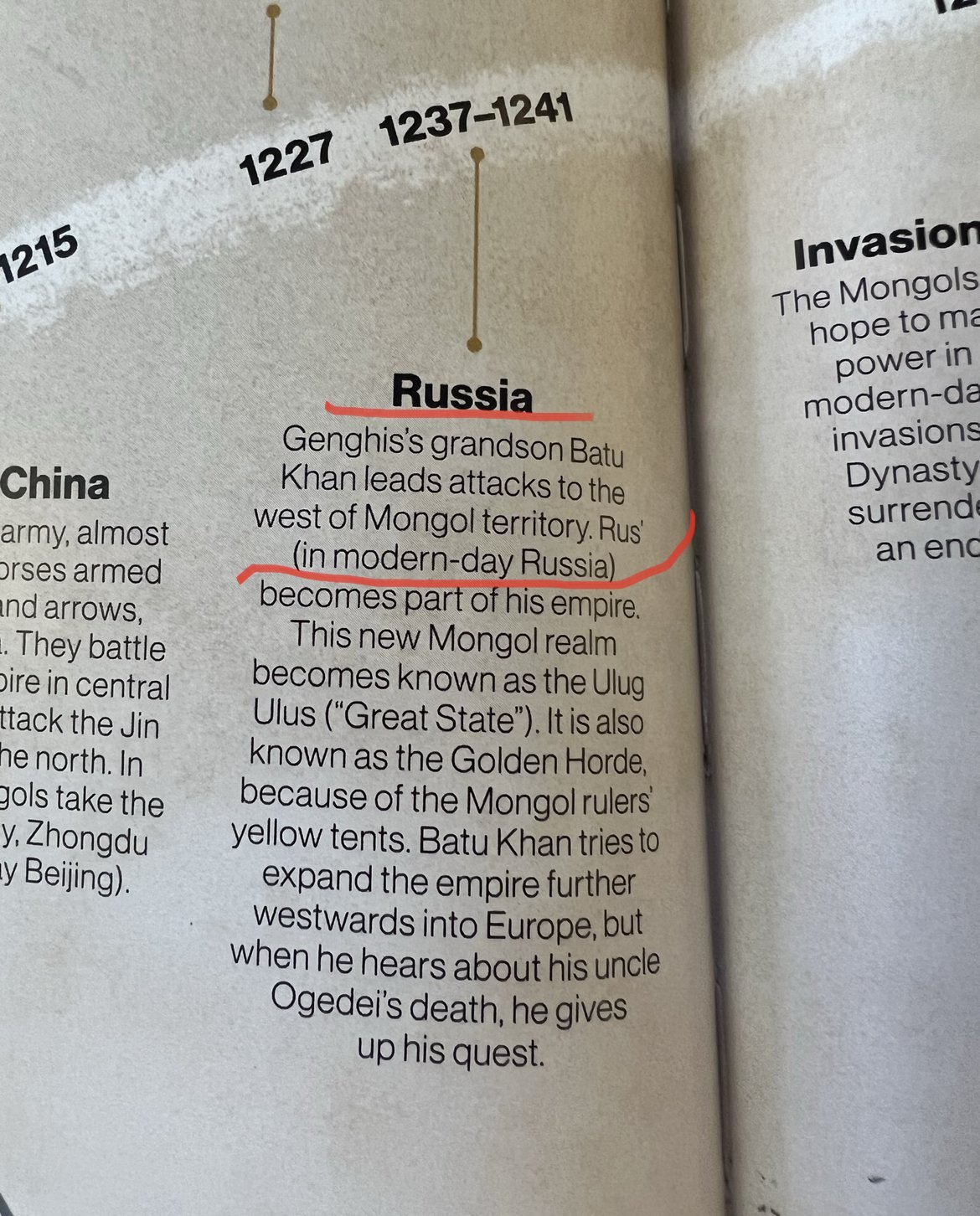
Peter I, Muscovian tsar, a sadist with big ambitions and having sentiment to Europe, has cheekily renamed country of Muscovy into Russia while “borrowing” ideas for the brand new flag from Netherlands by simply swapping stripes and proclaiming himself as “emperor of all Russias”.
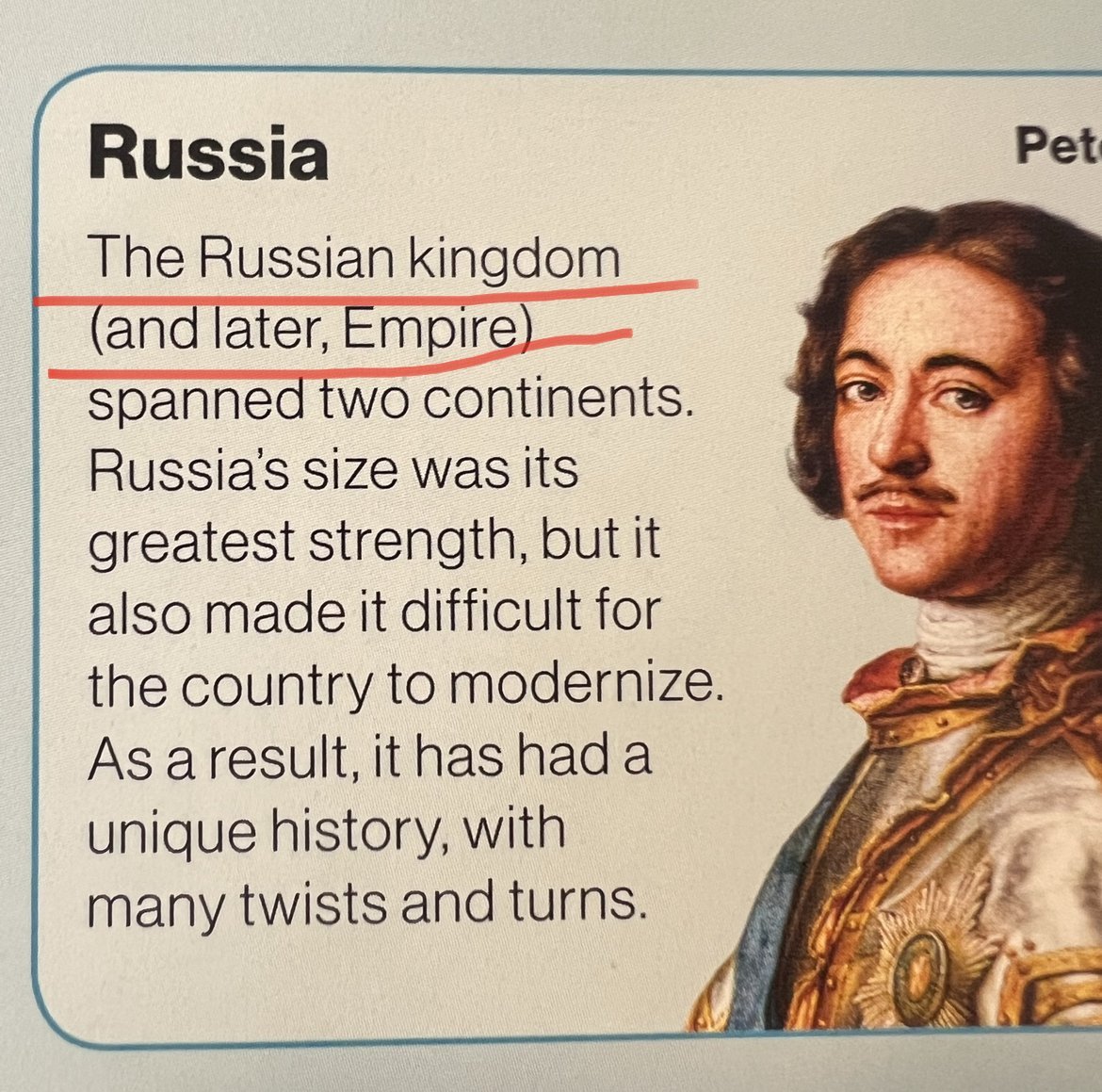
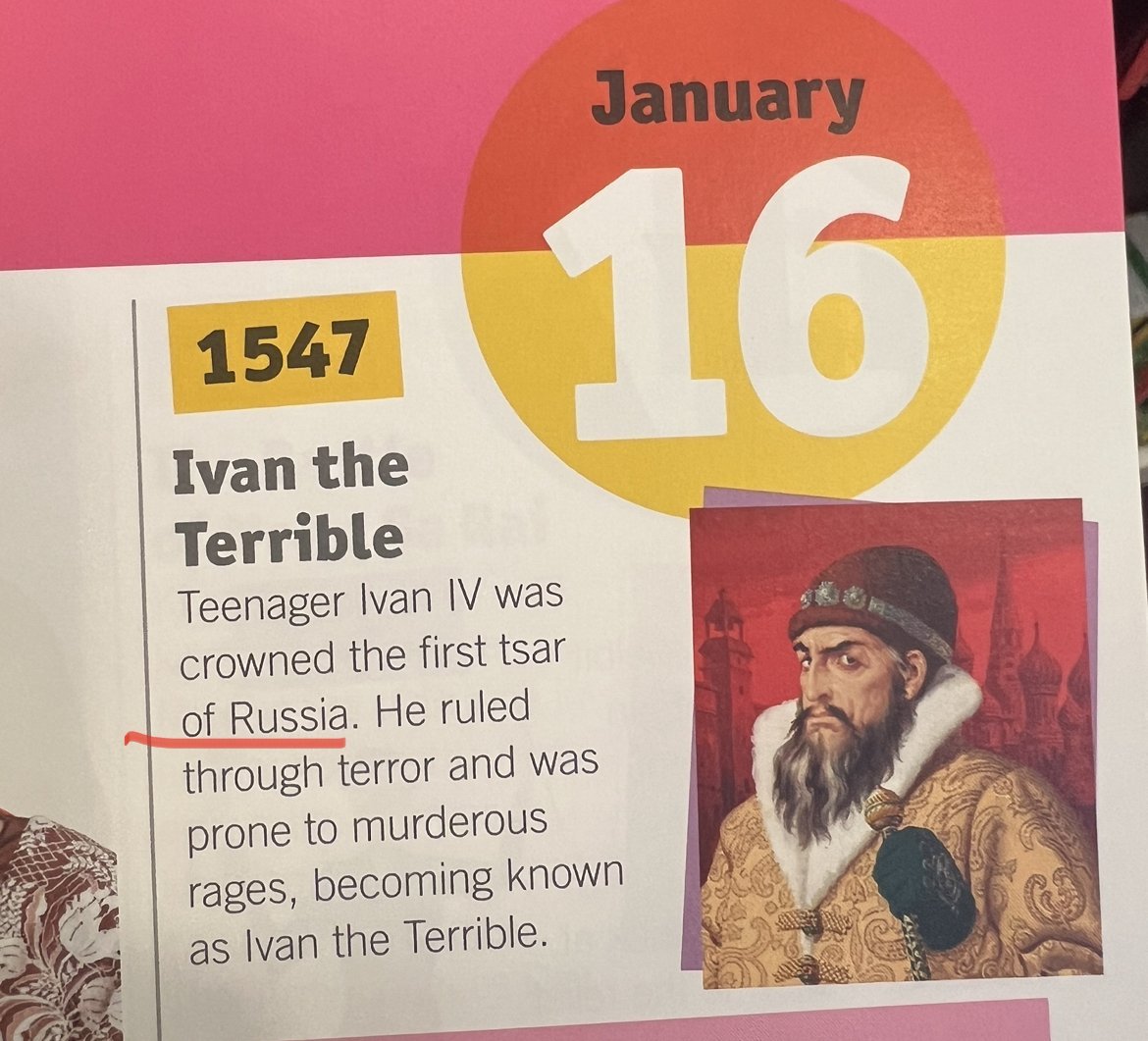
There is so much to choose from British books for kids about history. It’s meant to be an educational joy ride when you can gallop through history effortlessly while hopping between cities, times and important historical figures.
You would easily come across such Russian cities as Moscow or St Petersburg, but you would never find a mention of the ancient Kyiv. Instead, children would see maps where everything is just Russia, be it Ukraine with its historical states, Poland, or countries of Caucasus like Georgia, Armenia, Azerbaijan - no, it’s all Russia, no further clarification required.

All this paints a grotesque picture: once upon a time there was an ancient and mysterious Rus’ or Russia (who knows!), somewhere around Kyiv, then, suddenly, all these people with all their cultural heritage teleported to lands around Moscow and settled there!
Who are those Ukrainians, where did they come from remains a big mystery.
I thought the answer for this crooked misrepresentation might be hidden in the children’s books and schoolbooks. This is why I decided to explore what’s in bookshops and libraries in London. I explored loads of publications for kids. A lot of them are shiny, brand new and expensive history encyclopedias and books. Splendid infographics, bright illustrations and photographs. They are glossy and attractive, but the content is sometimes shocking.
In just a few hours I was feeling dizzy, but also full of rage and fury: all these books were like mirrors reflecting centuries old Russian propaganda onto unsuspecting young readers. They would feature this perpetual artificial connection between Rus’ through the Russian Empire to modern Russia with the legends being presented as facts. Everything that doesn’t fit the narrative, like Ukraine and all of its true and real historical heritage, is redacted, blended in or just ignored.
So what do we as parents and kids learn from these books? Basically, Russia has existed nearly eternally, probably, right after dinosaurs made space for our ancestors. All the maps state that Russia was always there, right next to ancient Persia and Constantinople. Not Rus’, children, but Russia.
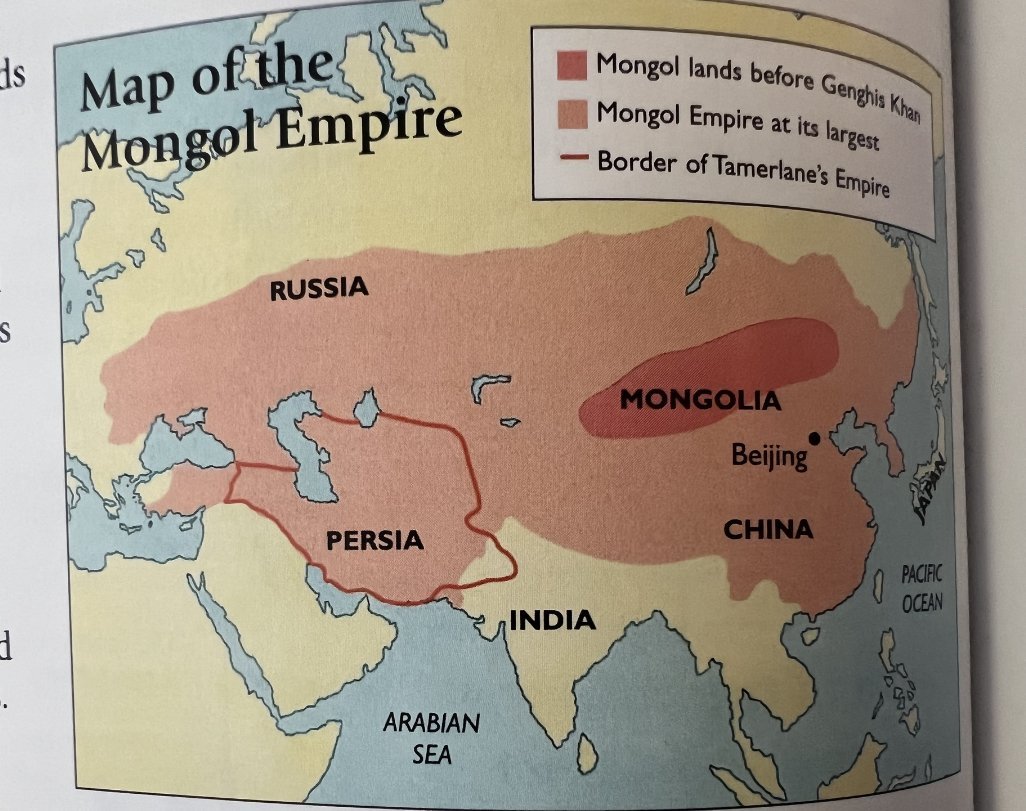
Slavs and Muscovites
Speaking of Slavic tribes, according to these books, they somehow emerge on the territory of modern Russia. No mention of the fact that historians name lands between Vistula and Dnipro rivers as the place where these tribes settled – and these are territories of modern Ukraine, Belarus and Poland, nothing to do with Russia at all.
A good reference would be the book “The Gates of Europe: A History of Ukraine” by Serhii Plokhy, professor of Ukrainian history at Harvard University. Moreover, there are important works of Soviet historians free of propaganda, like the ones by Boris Rybakov.

Contrary to that, we see an explanation that Russia, with all the made up meanings of this word, is a motherland and at the heart of all of the Slavic heritage.
How Novgorod gained a century of age
According to the rules and in line with the best of Russian propaganda, books bring Novgorod into existence in the IX century. A legend, not confirmed by any respected historian, contrasts with scientific research by Valentin Yanin clearly stating the town was founded in the middle of X century.
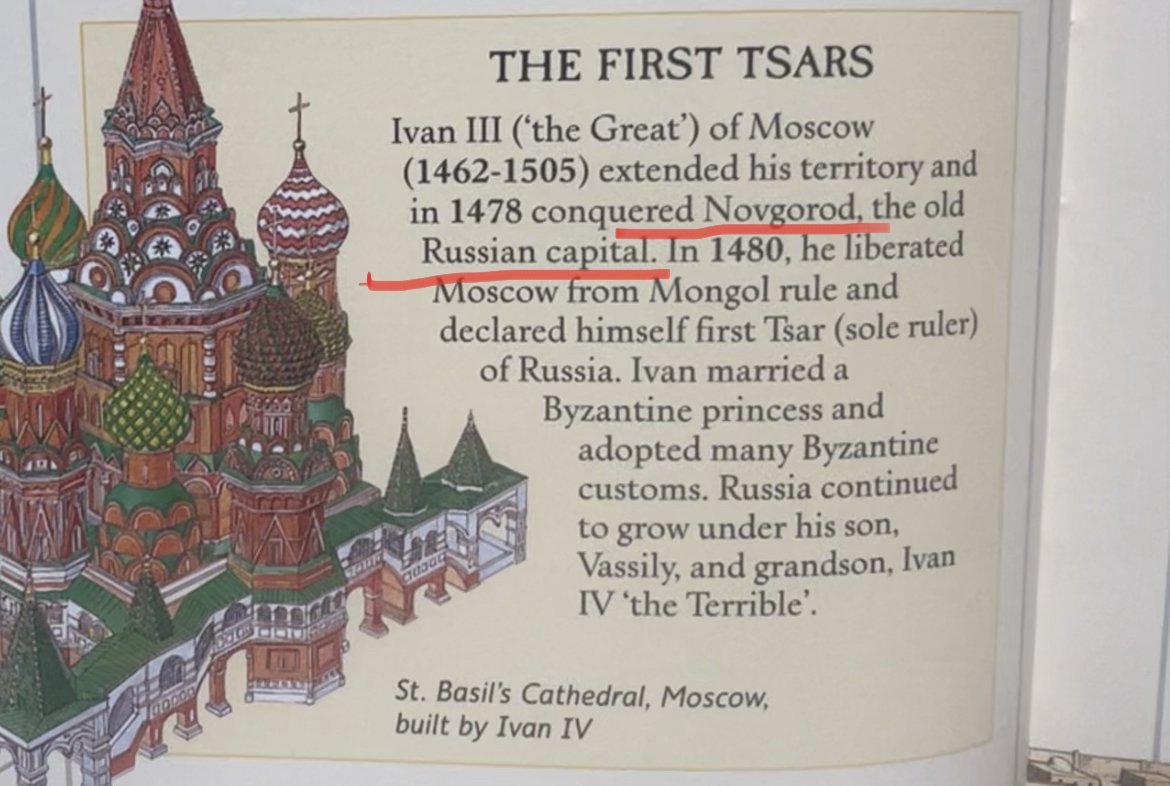
Rurik, Oleg and Kievan Russia
Let’s talk about Rurik. Just to remind you, he appears in the “Primary Chronicle” in the context of the IX century and is assumed to be a father of Grand Prince Igor, as well as the one who starts Rurik’s dynasty.
Surprisingly or rather not, “Sermon on Law and Grace”, one of the earliest Slavonic texts, dating back to 1037-1050s, never mentions Rurik. Though, this document highly praises Yaroslav the Wise, Volodymyr and his father Sviatoslav, as well as his grandfather Igor, the “elder” one of two Igors. Rurik is never mentioned in any other document. He is a fictional figure – even some Russian historians agree with that, for example Igor Danilevsky.
It’s a nice fairy tale, could even make into books, but it must be labelled and described accordingly to separate facts from the fiction.
Legendary Rurik, together with Oleg, likely another fiction, settles in Novgorod that, again, didn’t exist at the time, or Ladoga, Scandinavian settlement on the river. Then, allegedly, he moves on to Kyiv to become the first prince there.
Oleg – another hero of “Primary Chronicle” – who could not be verified by any other document. Ladoga has never become a town, but it is vital for Russian propaganda in order to create a myth that could overshadow the importance of Kyiv as the Rus’ capital, as well as to make the point that Ukrainian ancestors couldn’t establish a state without help from the outside.
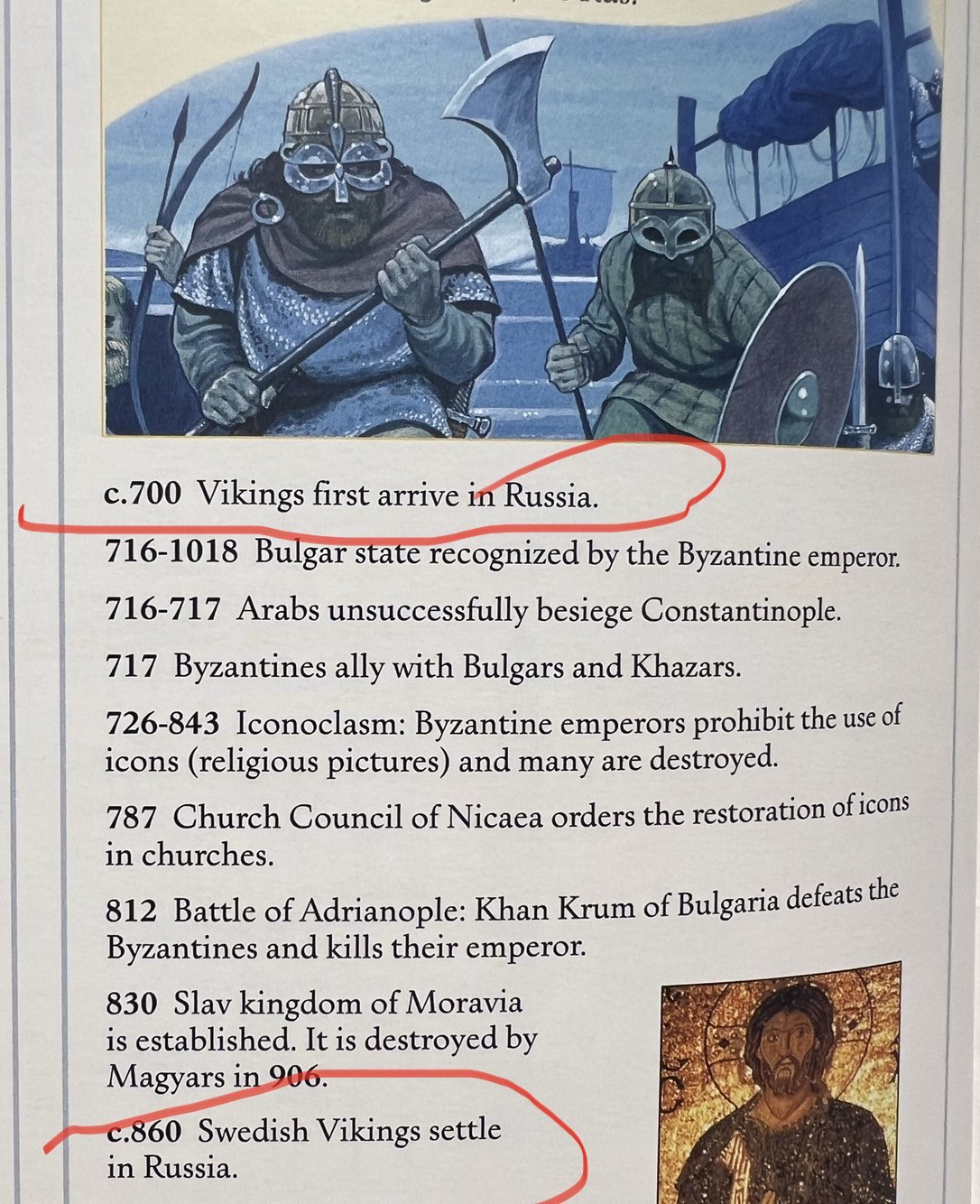
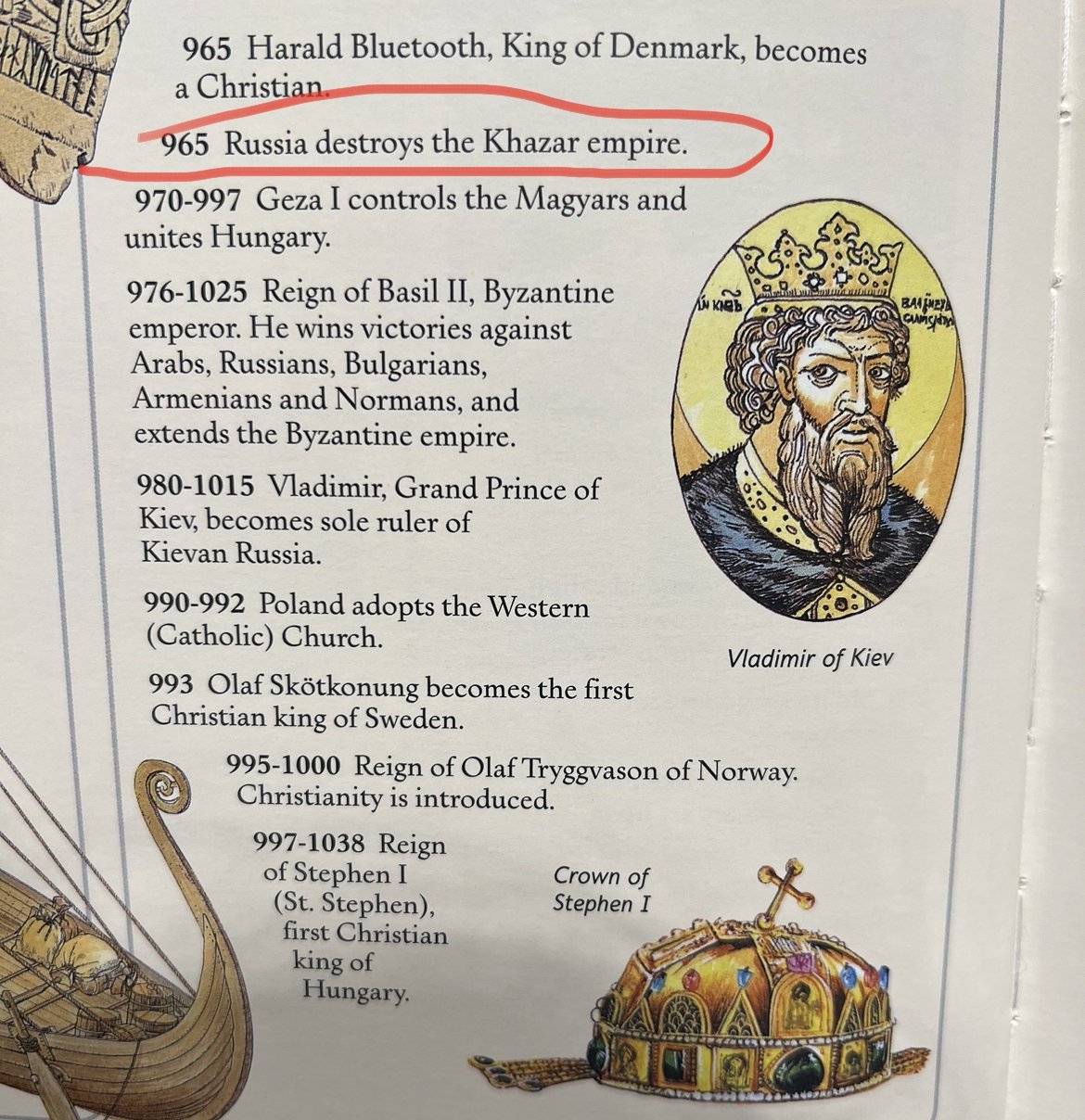
All in all, this fairy tale tells us true rulers have come from these first capitals to settle in Kyiv and set the foundation of what children and adults should know as Russia. Not just Russia, but “Kievan Russia”! A pseudo historical construct modern Russia is very fond of.
I’m curious to know what sources authors have used and who helped them to create such a grotesque depiction of history. I contacted Penguin and Usborne to seek for answers, but the most I could get is “we will investigate”.
I managed to find a single book published by the British Library among the rest where it would say Kievan Rus’ on the map – it was a story about king Harald III of Norway whom Elisiv of Kyiv married to become Queen consort of Norway. The rest of the books, though, would tell that vikings came to Russia, then everything done by Grand Princes of Kyiv is labelled as Russian achievements: Russia defeated Khazars, Russia baptised etc.
“Of all Russias” and “Russian kingdom” fictions
There are no mentions either of the kingdom of Rus’ or Danylo Romanovych, Daniel of Galicia, crowned by papal archbishop in 1253. Daniel of Galicia is a historic figure of great importance. Serhii Plokhy, professor of Ukrainian history at Harvard University, labelled him as a “new star of Rus’ politics” after the fall of Kyiv in XIII century.
No, the “Russian” story gallops straight to Muscovian tsars “of all Russias“, such as Ivan III. He and his grandson, Ivan IV, simply appended those words to their titles. You won’t learn from these books that kings of the Grand Duchy of Lithuania and Polish–Lithuanian Commonwealth had “King of Rus’” and “Great King of Rus’” in their titles as well. Titles are not just a formality, but also a claim of the land a monarch might not control necessarily.
Whenever Peter I is mentioned in those books, you won’t see Muscovy alongside as the country was called back in time – it is simple to verify this via many documents, muscovy roubles and maps of that epoch. Instead, repeatedly, readers see mentions of a “Russian” kingdom (or tsardom) that never existed. Maybe, it’s just too confusing for the reader?
We manage to comprehend that something that once was Ottoman Empire is now largely Turkey, Persia through centuries transformed into Iran, we don’t confuse Austria and Australia (well, mostly) and so on. There is no confusion and need to “simplify” in these cases, right? Somehow, it’s different and complicated with “Russia”, so let’s just assume it was always called like that...

Obviously, after learning “history” presented like that, foreigners would struggle to know that Rus’ is an integral part of Ukrainian history and heritage. Those historic events took place on the territory of modern Ukraine with the centre in Kyiv.
They wouldn’t know modern Russia emerged on the territories between Oka and Volga rivers and it is a history of Muscovy, its tsars’ claims and colonial wars on surrounding territories and nations – not something different.
Russia may create whatever alternative, fictional history it needs to support its ambitions. It may well throw Kyiv out of all of its schoolbooks – something it does already anyway. But why would other countries blindly accept and amplify it through children's books and other sources of the information?

It is not just about Britain, it’s a common situation in other countries – my friends could find the same narrative in history books in no time. Some French book states that Ukraine is part of “Russian region”, likely adopting the link between ancient Rus’ and today’s Russia (it’s all the same!).
The problem is that such short, “encyclopedic” articles are easily remembered and become a foundation of how we see and understand the world since our childhood. Afterwards, it’s so much harder to change it and explain, for example, what is the difference between Ukraine and Russia, why this current war has started, how could these famous creators like Repin, Gogol, Malevich and many others not be Russian?
I’m very concerned about this matter. Why does the West, showing so much attention to postcolonial trauma, still largely ignore Ukraine in the context of history? Ukraine is either attached, blended into the fictional “Russian world” or simply cut out of the history altogether, leaving a huge gap and creating a grotesque story of this part of the world.
It is happening at the same time when there are a lot of great books and lectures published on the subject of Ukrainian history – Timothy Snyder, Serhii Plokhy, Anne Applebaum among the rest are shedding light on this vast moscovian darkness.
I’m convinced, today, when Russia started another war in an attempt to destroy Ukraine, take over Ukrainian historical and cultural heritage in its entirety, it is time for the civilised world to refute all of these centuries old Russian colonial narratives, separate fiction from facts and simply stop following, promoting and repeating after them.
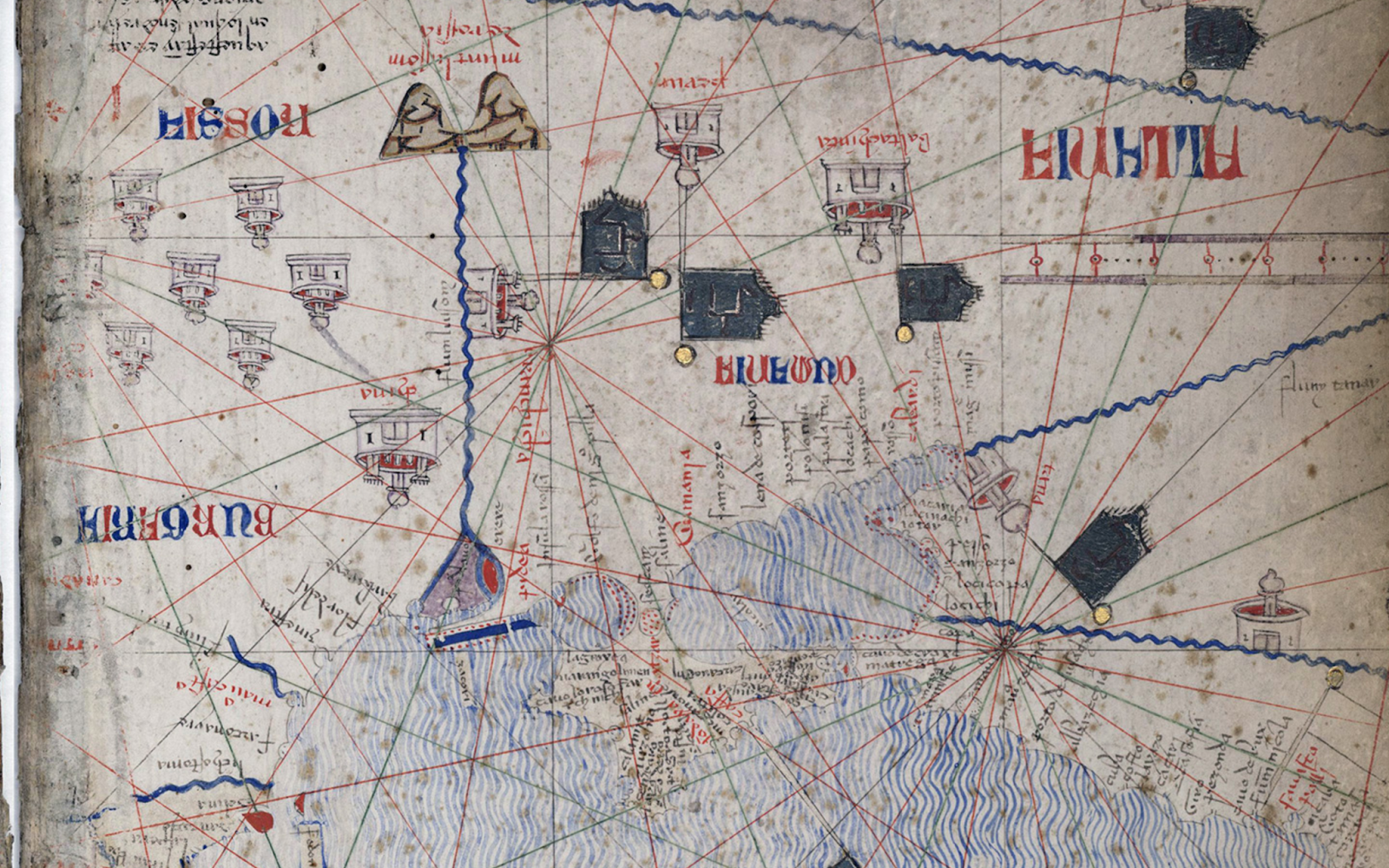
Rus’ is our essence
Oleksandr Alfiorov, Ukrainian historian, PhD in History, Academician of the National Academy of Science of Ukraine
This indeed is a big problem. European historians largely use terminology adopted from the Soviet Union and Russian Empire. This taxonomy is of Russian language, so oftentimes we observe not just erroneous substitution of terms like Rus’ and Russia, but a taxonomical war waged by Russia.
It is common for the Western world to transliterate all the names – of people, toponyms - from Russian like Vladimir (rus) - Volodymyr (ukr), Kiev (rus) - Kyiv (ukr), Dniepr (rus) - Dnipro (ukr) and so on.
Studying topics of Rus’ and Byzantine Empire were only allowed in the metropolises like Moscow and Leningrad (now St Petersburg) during Soviet Union times. This means Ukrainian historians basically weren’t allowed to participate, voice and advance historic timeline not matching Russian views. So, often, if someone wanted to study money of Kyivan Rus’ epoch, they would be denied on the basis that “Ukraine didn’t have any money and those are Russian money of the time”.
Obviously, such a situation would prevent Ukrainians from having their version of history of their own land – importantly, matching scientific studies – from emerging and being popularised. Similarly, there was no way a solid scientific tradition would be set in the relation of studying Kyivan Rus’ and the Byzantine Empire. Rus’ is our essence, a foundation of all our state building processes. Even after Ukraine gained its independence, a lot of our historians would remain enchanted by Russian myths. Russians, however, would continue to rob us of our national memory since the collapse of the Soviet Union.
Speaking of Britain, I’d like to note that British kids, as a first thing, do not learn about Romulus and Remus founding Rome. Simply because it doesn’t make sense! Although, we all know Romans had colonies in Britain, but understand it was a Roman dominance at the time. Ukrainians do not start learning their history from Athens, ancient Greeks and their great culture that made its way up north to Pontic littoral (south of modern Ukraine). No, both us and Brittons start exploring our history and culture from our own historical periods. Only modern Russia, as well as its predecessors attempts to begin its history from “Athens” and “Rome” equivalent – they start from Kyiv. This is despite the fact that lands of Muscovy where Muscovy tsardom emerged were peripheral to Ukrainian state of Rus’. These lands were included into the state at the beginning of XI century, being colonised by our ancestors were they founded cities and became part of the population – a mixture of different nationalities living there.
This eastern periphery has fallen under the rule of Mongols exactly because nobody wanted or was interested to contest it for real. That’s why muscovian lands became part of Golden Horde whilst a Kingdom of Rus’, Regnum Ruthenorum, emerged on the lands of modern Ukraine – something Russians don’t like to talk about as it is a superior form of state at the time compared to the situation of Muscovy.

People need to understand that the topic of Rus’ in Russian interpretation is a big story of manipulation and substitution of concepts and names. It is nothing else than a continuation of Russian Empire and Soviet Union politics in a search of Russian identity, but this identity is a stolen one.
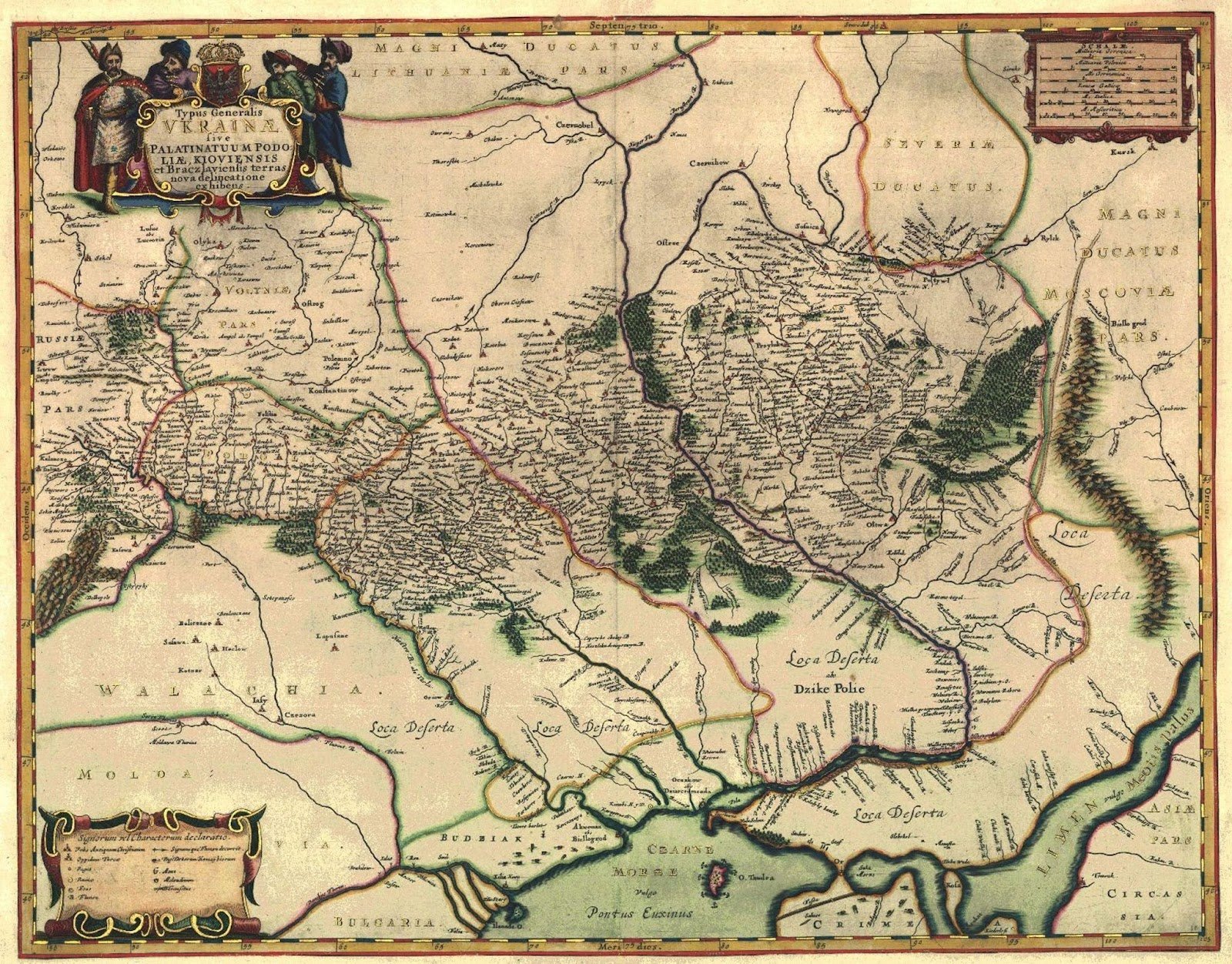
Russians violate principle of studying history
Vitaly Dribnytsia, Ukrainian historian, college teacher of History, author of History schoolbooks
There are two main principles of studying a nation's history. First one starts from the moment of the nation's ancestors' settlement on some territory.
Second one is about studying history in the borders of the current nation’s state. For instance, there is a Russian federation in its present borders, so that its history should be presented from the moment Neanderthals were discovered there. It would be a mistake to mention those Neanderthals discovered on the territory of modern Ukraine, because it’s irrelevant as it happened outside of the borders of modern Russia.
Russians, though, do not stick to these principles. The reason for that is clear: Ukrainian lands were part of the Russian Empire when they started to apprehend their own history led by Vasily Tatishchev. At the time, it was acceptable to approach the history of the state like that. The same applies to works of Nikolay Karamzin, Sergey Solovyov or Vasily Klyuchevsky. Nothing has really changed after the collapse of the empire, as the territory of the Soviet Union that emerged in place of it still largely included the same lands.
The situation changed dramatically after the collapse of the Soviet Union – they must’ve revised their history books by removing everything related to modern Ukraine. It is how it is meant to be – every generation revises history according to existing borders of their state. Russians, however, violate this approach deliberately as it is vital for them to consider Ukraine, including Crimea, as an integral part of Russia.
Nowadays, there are two main schools of History in Russia. One is based in St Petersburg, the other one – in Moscow. The former stated that Russia violated the territorial principle of maintaining the state's historical timeline, therefore it must be revised. The latter, though, has won a political argument and was supported by Putin. This fraction continues imperial narratives from the times of Tatishchev, turning blind eye to the simple fact Russia is different, smaller, in size than the Russian Empire was. They are appropriating our history, including Rus’ while Kyiv is out of their political and territorial reach. Russians doing this for one reason – they are imperialists in their nature.
Western scientific community started showing interest in Russia only after the end of WWII. Leading universities started opening departments of Eastern Europe history even in the state of the Cold War. Though, these departments inevitably were quickly winding down into so-called Russistics or Russian studies due to the presence of the Soviet Union at the time which was seen more like Soviet Russia. These departments were headed by emigrants from the Russian Empire or Soviet Union. They were well educated, but in the same vein of imperial spirit that they brought up there with them. The Ukrainian independent state didn't exist back then, so there was nobody who could “promote” Ukrainian views.
Things started to change only once departments of Ukrainian studies were opened in Harvard university and University of Alberta headed by Ukrainians – Omeljan Pritsak, Serhii Plokhy, Serhy Yekelchyk. Unfortunately, they are too few and the majority of the world sees the history of Eastern Europe through a Russian lens.
We need to do something with it to change its current state. The fact that ancient Rus’ is being easily confused with Russia is appalling. It’s Russian propaganda that pushes their narratives. They are trying to put an equality sign between the Hellenistic form of Rus’ and modern day Russia - it’s absurd! Rus’ from chronicles was situated on the territory of modern Ukraine, that’s we have the common term “Rus’-Ukraine” since the 19th century coined by Mykhailo Hrushevsky. Because it makes sense and Russia has nothing to do about it. Somehow, such a farce lies in the very foundation of modern Russian history. A lot of their historians understand this too well, but it is beneficial for them and their state. Even the most liberal of them, like Igor Danilevsky, are poisoned with this imperial virus.

